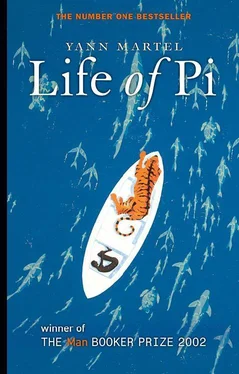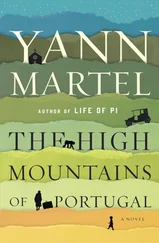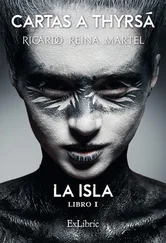Yann Martel - Life of Pi
Здесь есть возможность читать онлайн «Yann Martel - Life of Pi» весь текст электронной книги совершенно бесплатно (целиком полную версию без сокращений). В некоторых случаях можно слушать аудио, скачать через торрент в формате fb2 и присутствует краткое содержание. Год выпуска: 2002, ISBN: 2002, Издательство: Canongate Books, Жанр: Современная проза, на английском языке. Описание произведения, (предисловие) а так же отзывы посетителей доступны на портале библиотеки ЛибКат.
- Название:Life of Pi
- Автор:
- Издательство:Canongate Books
- Жанр:
- Год:2002
- ISBN:9781847674210
- Рейтинг книги:3 / 5. Голосов: 1
-
Избранное:Добавить в избранное
- Отзывы:
-
Ваша оценка:
- 60
- 1
- 2
- 3
- 4
- 5
Life of Pi: краткое содержание, описание и аннотация
Предлагаем к чтению аннотацию, описание, краткое содержание или предисловие (зависит от того, что написал сам автор книги «Life of Pi»). Если вы не нашли необходимую информацию о книге — напишите в комментариях, мы постараемся отыскать её.
Life of Pi — читать онлайн бесплатно полную книгу (весь текст) целиком
Ниже представлен текст книги, разбитый по страницам. Система сохранения места последней прочитанной страницы, позволяет с удобством читать онлайн бесплатно книгу «Life of Pi», без необходимости каждый раз заново искать на чём Вы остановились. Поставьте закладку, и сможете в любой момент перейти на страницу, на которой закончили чтение.
Интервал:
Закладка:
I returned the ball to the cup and added a little water. I covered it and set it aside. My mouth watered as I waited. When I couldn’t stand the wait any longer, I popped the ball into my mouth. I couldn’t eat it. The taste was acrid, but it wasn’t that. It was rather my mouth’s conclusion, immediate and obvious: there’s nothing to be had here. It was truly waste matter, with no nutrients in it. I spat it out and was bitter at the loss of precious water. I took the gaff and went about collecting the rest of Richard Parker’s feces. They went straight to the fish.
After just a few weeks my body began to deteriorate. My feet and ankles started to swell and I was finding it very tiring to stand.
CHAPTER 78
There were many skies. The sky was invaded by great white clouds, flat on the bottom but round and billowy on top. The sky was completely cloudless, of a blue quite shattering to the senses. The sky was a heavy, suffocating blanket of grey cloud, but without promise of rain. The sky was thinly overcast. The sky was dappled with small, white, fleecy clouds. The sky was streaked with high, thin clouds that looked like a cotton ball stretched apart. The sky was a featureless milky haze. The sky was a density of dark and blustery rain clouds that passed by without delivering rain. The sky was painted with a small number of flat clouds that looked like sandbars. The sky was a mere block to allow a visual effect on the horizon: sunlight flooding the ocean, the vertical edges between light and shadow perfectly distinct. The sky was a distant black curtain of falling rain. The sky was many clouds at many levels, some thick and opaque, others looking like smoke. The sky was black and spitting rain on my smiling face. The sky was nothing but falling water, a ceaseless deluge that wrinkled and bloated my skin and froze me stiff.
There were many seas. The sea roared like a tiger. The sea whispered in your ear like a friend telling you secrets. The sea clinked like small change in a pocket. The sea thundered like avalanches. The sea hissed like sandpaper working on wood. The sea sounded like someone vomiting. The sea was dead silent.
And in between the two, in between the sky and the sea, were all the winds.
And there were all the nights and all the moons.
To be a castaway is to be a point perpetually at the centre of a circle. However much things may appear to change—the sea may shift from whisper to rage, the sky might go from fresh blue to blinding white to darkest black—the geometry never changes. Your gaze is always a radius. The circumference is ever great. In fact, the circles multiply. To be a castaway is to be caught in a harrowing ballet of circles. You are at the centre of one circle, while above you two opposing circles spin about. The sun distresses you like a crowd, a noisy, invasive crowd that makes you cup your ears, that makes you close your eyes, that makes you want to hide. The moon distresses you by silently reminding you of your solitude; you open your eyes wide to escape your loneliness. When you look up, you sometimes wonder if at the centre of a solar storm, if in the middle of the Sea of Tranquillity, there isn’t another one like you also looking up, also trapped by geometry, also struggling with fear, rage, madness, hopelessness, apathy.
Otherwise, to be a castaway is to be caught up in grim and exhausting opposites. When it is light, the openness of the sea is blinding and frightening. When it is dark, the darkness is claustrophobic. When it is day, you are hot and wish to be cool and dream of ice cream and pour sea water on yourself. When it is night, you are cold and wish to be warm and dream of hot curries and wrap yourself in blankets. When it is hot, you are parched and wish to be wet. When it rains, you are nearly drowned and wish to be dry. When there is food, there is too much of it and you must feast. When there is none, there is truly none and you starve. When the sea is flat and motionless, you wish it would stir. When it rises up and the circle that imprisons you is broken by hills of water, you suffer that peculiarity of the high seas, suffocation in open spaces, and you wish the sea would be flat again. The opposites often take place at the same moment, so that when the sun is scorching you till you are stricken down, you are also aware that it is drying the strips of fish and meat that are hanging from your lines and that it is a blessing for your solar stills. Conversely, when a rain squall is replenishing your fresh-water supplies, you also know that the humidity will affect your cured provisions and that some will probably go bad, turning pasty and green. When rough weather abates, and it becomes clear that you have survived the sky’s attack and the sea’s treachery, your jubilation is tempered by the rage that so much fresh water should fall directly into the sea and by the worry that it is the last rain you will ever see, that you will die of thirst before the next drops fall.
The worst pair of opposites is boredom and terror. Sometimes your life is a pendulum swing from one to the other. The sea is without a wrinkle. There is not a whisper of wind. The hours last forever. You are so bored you sink into a state of apathy close to a coma. Then the sea becomes rough and your emotions are whipped into a frenzy. Yet even these two opposites do not remain distinct. In your boredom there are elements of terror: you break down into tears; you are filled with dread; you scream; you deliberately hurt yourself. And in the grip of terror—the worst storm—you yet feel boredom, a deep weariness with it all.
Only death consistently excites your emotions, whether contemplating it when life is safe and stale, or fleeing it when life is threatened and precious.
Life on a lifeboat isn’t much of a life. It is like an end game in chess, a game with few pieces. The elements couldn’t be more simple, nor the stakes higher. Physically it is extraordinarily arduous, and morally it is killing. You must make adjustments if you want to survive. Much becomes expendable. You get your happiness where you can. You reach a point where you’re at the bottom of hell, yet you have your arms crossed and a smile on your face, and you feel you’re the luckiest person on earth. Why? Because at your feet you have a tiny dead fish.
CHAPTER 79
There were sharks every day, mainly makos and blue sharks, but also oceanic whitetips, and once a tiger shark straight from the blackest of nightmares. Dawn and dusk were their favourite times. They never seriously troubled us. On occasion one knocked the hull of the lifeboat with its tail. I don’t think it was accidental (other marine life did it too, turtles and even dorados). I believe it was part of a shark’s way of determining the nature of the lifeboat. A good whack on the offender’s nose with a hatchet sent it vanishing post-haste into the deep. The main nuisance of sharks was that they made being in the water risky, like trespassing on a property where there’s a sign saying Beware of Dog. Otherwise, I grew quite fond of sharks. They were like curmudgeonly old friends who would never admit that they liked me yet came round to see me all the time. The blue sharks were smaller, usually no more than four or five feet long, and the most attractive, sleek and slender, with small mouths and discreet gill slits. Their backs were a rich ultramarine and their stomachs snow white, colours that vanished to grey or black when they were at any depth, but which close to the surface sparkled with surprising brilliance. The makos were larger and had mouths bursting with frightening teeth, but they too were nicely coloured, an indigo blue that shimmered beautifully in the sun. The oceanic whitetips were often shorter than the makos—some of which stretched to twelve feet—but they were much stockier and had enormous dorsal fins that they sailed high above the surface of the water, like a war banner, a rapidly moving sight that was always nerve-racking to behold. Besides, they were a dull colour, a sort of greyish brown, and the mottled white tips of their fins held no special attraction.
Читать дальшеИнтервал:
Закладка:
Похожие книги на «Life of Pi»
Представляем Вашему вниманию похожие книги на «Life of Pi» списком для выбора. Мы отобрали схожую по названию и смыслу литературу в надежде предоставить читателям больше вариантов отыскать новые, интересные, ещё непрочитанные произведения.
Обсуждение, отзывы о книге «Life of Pi» и просто собственные мнения читателей. Оставьте ваши комментарии, напишите, что Вы думаете о произведении, его смысле или главных героях. Укажите что конкретно понравилось, а что нет, и почему Вы так считаете.












